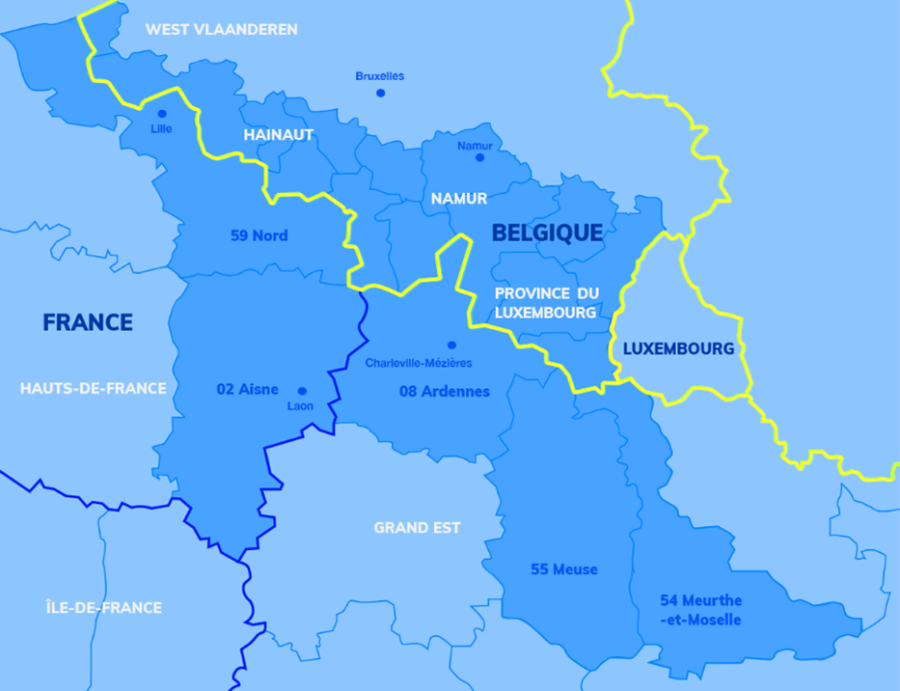WHAT:
The French-Belgium Health Observatory (OFBS) is a European Economic Interest Grouping (EEIG) created in 1999 to promote health cooperation between the two countries. The progressive consolidation of this initiative between French and Belgium partners led, in 2005, to the signature of an agreement which legitimised cross-border health actions, overseen by local and regional actors. Today, the Observatory counts a network of 52 partners (25 in France and 27 in Belgium) in both the public and private sectors.
The mission of the observatory is to be a permanent area of exchange where data, studies and evidence from the territories are made available for stakeholders operating in the health care sector. The Observatory pursues six main goals:
- To identify the needs of cross-border population;
- To encourage research activity to identify potential areas for cooperation, cross-border complementarities and innovative solutions for promoting health care;
- To provide support to local actors in the health care sector;
- To monitor regulations on health care matters and their implication for the whole sector (social security for workers, insurance issues etc.)
- To act as a point of reference for all cross-border population groups;
- To act as a catalyst for cross-border cooperation in the field of public health care.
WHERE:
The OFBS covers three Belgian provinces (Luxembourg, Namur, Hainaut), and five French departments, of which two are located in the Haut-de-France Region (Nord, Aisne), and three in the Grand-Est Region (Ardennes, Meuse, Meurthe-et-Moselle).

Source: website https://www.ofbs.org/
HOW:
The Observatory works under the rules set by the regulation on the European Economic Interest Grouping (No 2137/87). For the implementation stage, the partners of the network sign agreements and conventions to define their mutual commitments and obligations.
The role played by the Interreg programme France-Wallonie-Vlaanderen is also important. This programme covers the same territory as the Observatory and supports its objectives and activities, in particular regarding the operations financed under the ‘Priority Axis 4: Promoting the cohesion and the identity of cross-border territories’ (ERDF provision: EUR 32 million). For instance, a set of publications had been financed by the Interreg Programme which address different aspects (social, legal and economic) which impact the provision of health care services on a cross-border basis.
RESULTS:
Over the past 20 years of cooperation, the Observatory has successfully improved access to healthcare facilities for the cross-border population. The Observatory’s priorities are focused on seven fields which have yielded the following results:
- 7 instances of Inter-hospital cooperation have been established as a result of local initiatives. These are: between the hospitals of Mouscron (BE) and Tourcoing (FR), between the hospitals of Yepres (BE) and the French health insurance fund (CPAM) of Dunkirk and Armentières, between the hospitals of Oostduinkerke (BE) and Dunkirk (FR), between the hospitals in Sambre Avesnois (FR) and Mons (BE), between the University Hospital in Lille (FR) and the hospital of Renax (BE), between the hospitals of Tournai (BE) and Valenciennes (FR) and between the mental health institutes of Lille (EPSM Lille-Métropole – FR) and Menin (BE).
- Patients’ rights issues have been addressedthrough the elaboration of studies and reports such as “The Patient-Doctor relation in healthcare structures in France and Belgium”, published in 2012, and financed by Interreg IVA France-Wallonie-Vlaanderen and Interreg IV Grand Région.
- Elderly people’s needs in the cross-border area have been investigated with the support of the Interreg France-Wallonie-Vlaanderen programme. It is estimated that more than 1000 elderly people living in France are supported by Belgian institutions, with particular implications for mobility.
- Disabled people’s needs have also been focused on with the aim of improving the quality of information regarding facilities, structures and accommodation for this target group. In December 2011, an agreement was signed between the two countries to improve the quality of support for disabled people, to ensure continuity in service provision, to make the best use of human and physical resources and to promote the exchange of knowledge and good practices.
- 7 ZonesOrganized for the Access to Cross-border Healthcare (ZOAST) were set up between 2008 and 2015 along the Franco-Belgian border as a result of cooperative work between partners brought together by the Observatory.
- Emergency aid issues have been solved through an agreement that authorises aid services to intervene across borders, allowing for a prompter response in case of necessity. The broader objective of the observatory is to put in place a cross-border regulation for urgent medical aid.
- Access to medication and prescriptions have been facilitated via specific framework agreements and people can now buy prescriptions issued in the other country.
The COVID-19 crisis has had important political implications. In December 2020, the ministers in charge of Health for Luxembourg, Belgium and Rhineland-Palatinate and Véronique Guillotin, Senator and Regional Councillor for Grand Est, presented a declaration of intent to “plan coordinated action in the event of pandemics and strengthen medical care in the Greater Region”. This declaration sets out the objectives and measures concerning: health protocols, quarantine measures, vaccination strategies, screening capacities, free movement of patients without administrative or financial obstacles, cross-border care of patients, emergency aid, exchange and material and human support, maintenance of a qualified workforce, training and prevention.
More information:
- Connectez-vous pour publier des commentaires
- Étiquettes
- health

